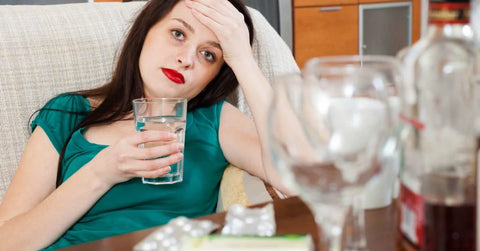
Girls nights are the best, except for the wine hangover that comes the next day. Empty bottles of wine and wine glasses smudged with lipstick usually stay scattered around your living room until afternoon. You ignore the text messages lighting up your phone. And you’re not even thinking about deleting those blurry selfies until you cure your hangover.
Luckily, there are a few things you can do to recover enough to salvage the rest of your weekend. But first, let’s clear up some basics about hangovers.
Wine hangovers are generally not as bad as hangovers from dark liquors like whisky or rum, but depending on the amount of wine you drank, they can still lead to next-day misery.
The symptoms we associate with a hangover come from a variety of sources--from dehydration to sleep loss. But they also relate to the way our body breaks down alcohol.
Our digestive system breaks down alcohol in the following sequence: alcohol first breaks down into acetaldehyde, which is 10 to 30 times as toxic as regular alcohol. This temporary toxin can cause your body to sweat and flush your skin as well as vomit. But that compound only stays in your body until it breaks down into non-toxic acetate.
It is this toxin that makes it more difficult for some people to have higher alcohol intolerance than others. It’s because their bodies are genetically faster at breaking down the alcohol into the toxin that our bodies reject, creating an overload.
Other toxic substances in wine that may contribute to hangovers include fusel oils, methanol (about 0.02% in a glass of wine), sulfites, histamines, tyramines and tannins. Like acetaldehyde, these are naturally occurring toxins that appear in other foods as well.
In order to fully recover from the adverse effects of toxins, we simply have to wait for our digestion to run its course.

Yes. Like all alcoholic drinks, wine is a diuretic, causing your kidneys to flush water from your body. This is why you’ll probably visit the ladies’ room a lot during a night of drinking.
In the morning, you’ll probably feel thirsty, have a dry mouth and experience other symptoms associated with moderate dehydration like a headache, fatigue, weakness and irritability.
Drinking can disrupt your sleep, so you might feel tired and find it difficult to concentrate.
Wine can irritate your stomach causing your body to release more acid and this can cause a stomach ache.
As you digest alcohol, your body produces a toxic compound that temporarily stays in your body called acetaldehyde. It can inflame your organs and make you feel nausea.
When you stop feeling the effects of being tipsy, you might experience anxiety and restlessness as your body attempts to regain balance.
Finally, you’ll probably have a wine headache, from dehydration.
It depends on how much you drank along with other factors. But usually no more than 24 hours.
Things that can prolong your hangover include dehydration, existing stomach problems, drinking too much alcohol and not getting enough sleep.
When you drink wine, the alcohol it contains can irritate your stomach lining, so the buffer of extra food in your stomach can definitely help.
Drinking on an empty stomach also worsens the hangover impacts of nausea and stomach aches because the alcohol can enter your bloodstream more quickly. This can also increase your chances of vomiting.

Because of the diuretic properties of alcohol, you’ll need to stay hydrated to cure your hangover. One glass of water per drink is a good rule of thumb, to account for your kidneys flushing fluid from your body.
Don’t forget that your body will also sweat or vomit the toxins produced during digestion, so hangovers can also deplete your electrolytes. If your body has an electrolyte imbalance, plain water alone won’t fully rehydrate you. Drink water with hydration tablets or food to improve your absorption of fluid and feel better.
Plain toast is gentle on your stomach. This can help soften the irritating effects that alcohol has on your stomach lining. This is especially true if you drank on an empty stomach. Meanwhile, eggs contain cysteine, a helpful chemical that breaks down toxins.
Even if you fall asleep quickly after drinking wine, you might not feel rested in the morning. Medical experts point out that drinking alcohol causes disruptive sleep.
Sleep loss introduces even more unsavory effects, too, such as moodiness, difficulty concentrating and lowered immunity.
Help boost your metabolism so it processes the alcohol in your body faster. If you do some cardio activities, with proper hydration to keep your body running smoothly, it can reduce the time you feel hungover. The faster you digest the alcohol, the faster your hangover will disappear.
Science tells us that the only true cure for a hangover is time. Once your body breaks down the alcohol you consumed and fully digests it, your body will return to normal. This will obviously take more time.
If you drank a lot, and you may even feel withdrawal symptoms along the way if you drank in excess. This is because our brains send signals to accommodate the entrance of a toxin into the body, and once that toxin leaves, it takes some time for brain chemistry to return to normal.
Don’t forget that the best hangover cure is prevention, the same advice Smokey Bear gives for avoiding fires.

Like alcohol, coffee is a diuretic, causing dehydration. Drinking coffee to cure a hangover will intensify your dehydration.
The saying goes “beer before liquor, never sicker.” But there isn’t actually evidence supporting the claim that the order of drinks can make you have worse or lighter hangovers.
This may reduce some of the mild withdrawal feelings you’ll experience, but ultimately, it will prolong your hangover symptoms.
Mixing pain medications or other medications with alcohol can be particularly harmful for your liver. It’s best to avoid them and stick to water and toast before bed.
Whether you’re expecting a hangover or not, don’t forget to keep one of our Healthy Human Steins by your bedside to hydrate yourself to sleep.
https://gotpurpletree.com/blogs/journal/tips-to-cure-a-wine-hangover
https://www.medicalnewstoday.com/articles/307334#effects-on-the-body
https://www.niaaa.nih.gov/publications/brochures-and-fact-sheets/hangovers
https://www.womenshealthmag.com/health/a19952705/two-day-hangover/